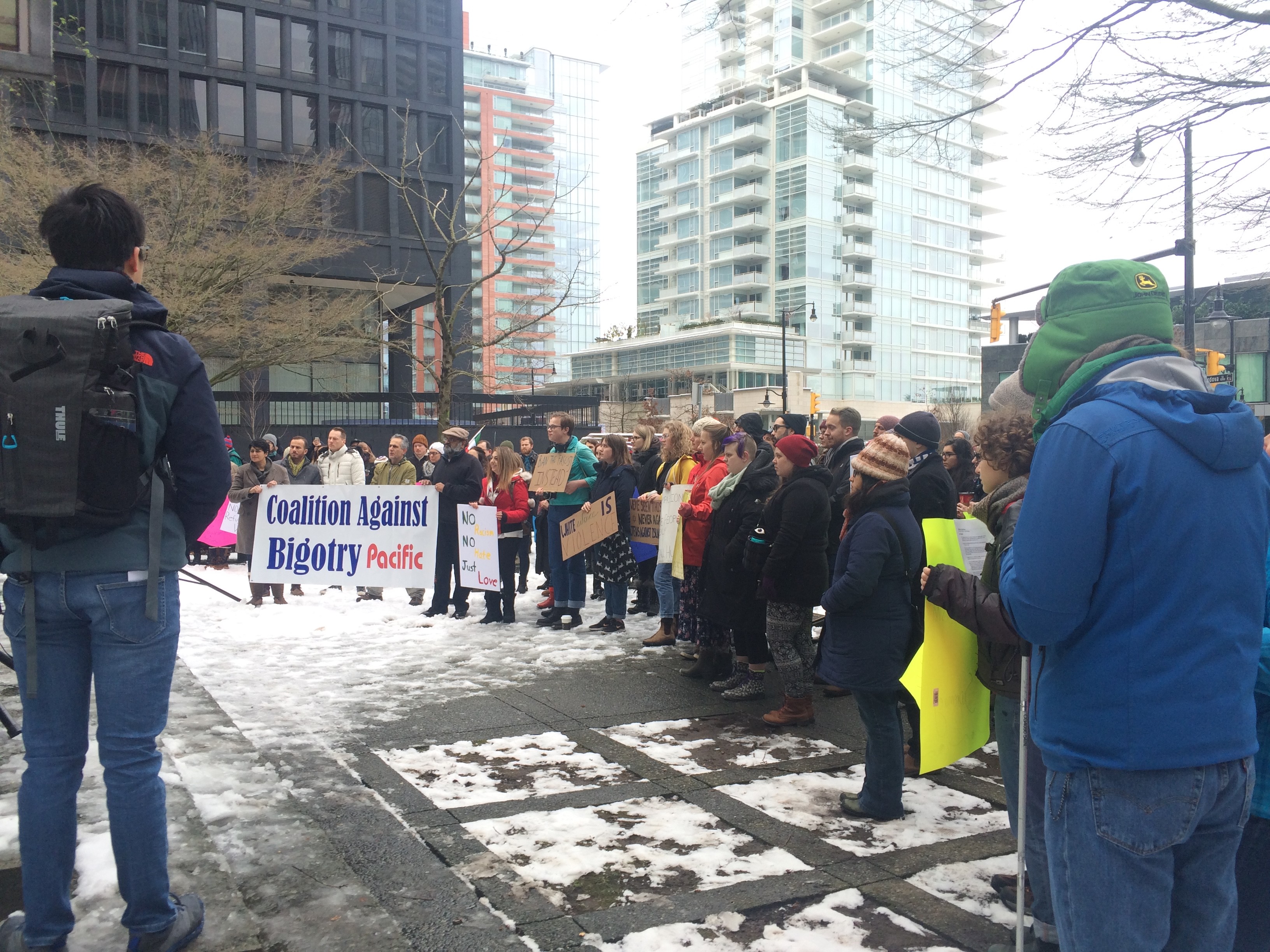Canadians Against the Ban; Shaping National Identity Through Acts of In-and-Exclusion
I took this photograph on Sunday, February 5, 2017 at Portal Park, just outside the U.S. consulate in Vancouver. Pictured are several protesters coming together to stand against the recent travel and refugee ban passed (through executive order) by Donald Trump in the United States. The executive order moved to pause all refugee resettlement programs in the United States for 120 days, imposed an indefinite suspension for Syrian refugees in particular, and also suspended visas from anyone visiting the USA from Iraq, Syria, Iran, Libya, Somalia, Sudan, and Yemen for 90 days (Exec. Order no. 13769, 2017).
Despite Trump’s insistence that this is “not a Muslim ban,” (Kertshcer, 2017) it does mainly affect and pertain to Muslim-majority countries, an aspect which can not and should not be overlooked, especially considering the President’s previous remarks to call for “a total and complete shutdown of Muslims entering the United States” (Kertshcer, 2017). Because “there is no data to support the view that refugees – Muslim or otherwise – pose more risk of committing acts of terrorism than citizens” (Shetty, 2017) this travel ban is clearly not a logical step to protect American civilians, but rather serves to shape the idea of who is worthy of being admitted into the country, as well as who can truly be considered a citizen. Additionally, the order includes an exception to the ban, which can be plainly read as an assurance that the Trump administration “will resettle Christians fleeing predominantly Muslim countries” (Shetty, 2017). This not-so-subtly informs the public who the priority is for American protection. This is further evidence of the fact that the “history of American citizenship as nationality has been [and continues to be] shaped by a series of inclusions and exclusions on the basis of xenophobia, racism, religious bigotry, and male privilege,” (Ong, 2003, p. 78). This aspect is not horribly different from the history of Canadian citizenship, as we have analyzed both in class and through readings such as Razack’s. Just as both countries were shaped by similar acts of exclusion, erasure and prejudice, both the United States and Canada continue to be affected by these aspects.
While this specific ban is an issue based out of the United States with direct and obvious ties to the seven countries explicitly mentioned, the global effect is much greater than that. In addition to affecting various parts of the world by spreading dangerous rhetorics of white supremacy, islamophobia, racism, and otherness, Trump’s travel ban also directly affects anyone with a dual citizenship in one of the included countries, which can and will affect Canadian citizens. The ban has sparked fears that families will be separated and citizens will be deported, as well as questions as to whether or not Canada will accept the refugees whom are denied access to the U.S. (Eagland, 2017). In addition to direct responses to the policy itself, the ban has also served to instill fear and even hatred in many people worldwide, including here in Canada. This increased fear, whether it be in the hearts of Muslim and Arab Canadians, or of white Canadians buying to the fear on which Trump is attempting to capitalize, is one of the reasons the local manifestation of this issue is so important.
Despite the fact that Trump’s actions have emboldened many who hold similarly hateful beliefs (for example, the recent shooter in the Quebec mosque shooting on January 29 (The Quebec City mosque attack: What we know so far, 2017)), it is naive to say that notions of white supremacy, islamophobia, and racism are new, or a direct cause of Trump. As Razack notes, in the post-9/11 world, Canada in addition to the USA has cracked down on the “deeply intensified… policing of bodies of color,” resulting in the indefinite detention of many Arab or Arab-looking men under the guise of suspicion of terrorism (Razack 2002, p. 4). Additionally, “refugees, it is argued, must be given time to learn respect for Canadian culture and original citizens must be given time to know who they can trust,” implying that the comfort of ‘original’ Canadians is somehow more important than the safety of refugees, who must learn to conform (Razack 2002, p.5). From this we can see that the issue of policing of the idea of national identity and belonging is not an inherently American problem, but rather one that much of the world- particularly in the Global North- shares.
As participants in these acts of exclusionary nation-building, it is therefore important that we, as Canadians, not become so naive as to think Canada is immune to the “rising global anxieties about multiculturalism” (Banting and Kymlicka 2010, p. 43). If we, as a country, want to continue to pride ourselves on our multicultural foundation, it is important that we stand up against these anxieties, and not follow suit. The manifestation of this particular issue in the context of Vancouver, is therefore necessary in order to show that while we are not the United States, we are not as different as we might like to believe, and we must demand change in the face of oppression in order to protect the rights of all citizens.
Works Cited
Banting, K., & Kymlicka, W. (2010). Canadian multiculturalism: Global anxieties and local debates. British Journal of Canadian Studies, 23(1), 43-72.
Exec. Order No. 13769, 3 C.F.R. (2017).
Kertshcer, T. (2017, February 03). Is Donald Trump’s executive order a ‘Muslim ban’? Retrieved February 05, 2017, from http://www.politifact.com/wisconsin/article/2017/feb/03/donald-trumps-executive-order-muslim-ban/
Ong, A. (2003). Buddha is hiding: refugees, citizenship, the new America. Berkeley: University of California Press.
Razack, Sherene. (2001). When race becomes place. In her Race, space and the law: unmapping a white settler society, pp. 1-20.
Shetty, S. (2017, January 30). The US War on Muslim Refugees. Retrieved February 06, 2017, from https://www.amnesty.org/en/latest/news/2017/01/the-us-war-on-muslim-refugees/
The Quebec City mosque attack: What we know so far. (2017, January 30). Retrieved February 06, 2017, from http://www.theglobeandmail.com/news/national/quebec-city-mosque-shooting-what-we-know-so-far/article33826078/
